 Indicator are bringing out the next volume in their excellent Columbia Noir series and this time it has a clearer theme than usual. Whilst there have been loose connections through the titles in previous sets, this time Indicator have gone out and compiled a box full of Humphrey Bogart noir films. Yes, one doesn’t feature him in an acting role but he produced it through his company Santana Pictures (named after his yacht).
Indicator are bringing out the next volume in their excellent Columbia Noir series and this time it has a clearer theme than usual. Whilst there have been loose connections through the titles in previous sets, this time Indicator have gone out and compiled a box full of Humphrey Bogart noir films. Yes, one doesn’t feature him in an acting role but he produced it through his company Santana Pictures (named after his yacht).
Columbia Noir #5: Humphrey Bogart includes:
Dead Reckoning (John Cromwell, 1947)
Knock on Any Door (Nicholas Ray, 1949)
Tokyo Joe (Stuart Heisler, 1949)
Sirocco (Curtis Bernhardt, 1951)
The Family Secret (Henry Levin, 1951)
The Harder They Fall (Mark Robson, 1956)
I’m always up for working through a set of film noir discs and love Bogart, so I leapt at the chance to review this.
My brief thoughts on all the titles are below, as well as on the transfers and special features.
Dead Reckoning
Director: John Cromwell
Screenplay: Oliver H.P. Garrett, Steve Fisher, Allen Rivkin (adaptation)
Based on a Story by: Gerald Drayson Adams, Sidney Biddell
Starring: Humphrey Bogart, Lizabeth Scott, Morris Carnovsky, Charles Cane, William Prince
Country: USA
Running Time: 100 min
Year: 1947
The earliest film in the set, Dead Reckoning, sees Bogart play Captain Rip Murdock, an ex-WWII paratrooper who’s called to Washington with his best friend and fellow paratrooper Sergeant Johnny Drake (William Prince) so that the latter can receive the Congressional Medal of Honour.
However, Drake runs away before making it to Washington and when Murdock goes looking for him, his friend turns up dead. Desperate to know what led to this, Murdock delves into Drake’s past and gets embroiled in some shady shenanigans between Drake’s squeeze, Coral (Lizabeth Scott) and a nightclub owner named Martinelli (Morris Carnovsky).
On one of the special features on this disc, Tony Rayns calls Dead Reckoning a “good generic title for a good generic picture” and I’d have to agree. It’s a decent, if unexceptional noir that’s an easy watch but struggles to set itself apart from the pack.
It’s got all the classic noir tropes that fans enjoy, such as the femme fatale, shadowy lighting, deeply flawed characters and enjoyably hard-boiled dialogue. However, it doesn’t add much extra to the mix.
Also holding the film back, in my opinion, is Scott, who feels a little like a cut-rate Lauren Bacall here and doesn’t match up to the rest of the main cast. Rita Hayworth was originally supposed to play Coral, but after contract disputes put an end to this, Scott was borrowed from Paramount. Scott claims the director John Cromwell paid her little attention, only being concerned with her hitting marks, affecting her performance. There’s little chemistry between her and Bogart either. Rayns argues this less-than-convincing and inexpressive performance fits the lying nature of her character, but this might be reaching a bit.
Cromwell was an ex-actor and theatre director who had directed one of Bogart’s first plays. As a favour then, Bogart, who had a say on who directed his pictures at this point, asked for Cromwell to helm the picture. He does a good job with the material, crafting a film that moves at a decent pace and certainly holds your attention, despite any generic aspects.
Overall then, Dead Reckoning is a solid noir that ticks all the boxes and moves at a good pace but is a little too by-the-numbers to stand among the greats of the genre.





Knock on Any Door
Director: Nicholas Ray
Screenplay: Daniel Taradash, John Monks Jr.
Based on a Novel by: Willard Motley
Starring: Humphrey Bogart, John Derek, George Macready, Allene Roberts, Candy Toxton, Mickey Knox, Barry Kelley
Country: USA
Running Time: 100 min
Year: 1949
After the war, with the Hollywood studios holding less of a stranglehold over the film industry than before, a number of big-name stars, such as James Cagney and John Garfield, started setting up their own production companies, to gain greater control over the films they made. After an initial failed attempt, Humphrey Bogart followed suit and started Santana Productions in 1948, alongside his business manager Morgan Maree and Robert Lord, a writer and former Warner Bros. producer. Knock on Any Door was the first film made by the company.
The film opens with the murder of a police officer and the chief suspect is Nick Romano (John Derek), a handsome young criminal who goes to lawyer Andrew Morton (Humphrey Bogart) for help in representing him in court. Having known the young man for a number of years and being convinced of his innocence, Morton agrees.
With scant evidence to point the finger at anyone else though, Morton attempts to win the favour of the jury by recounting Romano’s difficult life since he’s known him. The film then spends much of the time flashing back to show this tale of a young man growing up in the slums after his father died in prison (partly due to the negligence of Morton).
Knock on Any Door was based on a hugely popular book by the African-American author Willard Motley. A few things were changed though, including focusing more on Bogart’s lawyer character and removing a plot strand with a strong homosexual subtext. The latter is understandable, given the strict rules against such content in films at the time, but excerpts in the set’s booklet suggest that narrative thread was very powerful and could have added a great deal to the film, which otherwise is rather a generic ‘wrong side of the tracks’ crime story.
The film starts off very well though, with a thrilling, sharply edited and moodily-lit bit of action. This energy tails off as the film moves on, unfortunately, and it gets a bit bogged down in melodrama in the mid-section. Thankfully, the finale is more gripping, so it ends quite powerfully, though I found Bogart’s grandstanding speech about society being to blame for Romano’s behaviour a little much.
This is a fault of the writing more than Bogart’s performance though. This role seems slightly out of character for Bogart, but it is in fact closer to his actual personality, as a cultured, chess-loving intellectual. Though I felt the content of his speeches was a little too moralistic and simplistic, his delivery of them is suitably rousing and Bogart clearly relishes the role.
The director here is the great Nicholas Ray and whilst it’s not his best film, he does a decent job. I particularly appreciated his great attention to detail, adding little touches like sweat stains on the judge’s back and the court artist opening the blinds to let in more light for his work. Some interesting side characters are added too, flavouring the otherwise bog-standard story.
The film also plays like an interesting counterpoint to Ray’s Rebel Without a Cause. Whereas that looks at how a middle-class boy might fall out of societal norms, this looks at how poverty can set a young man on the wrong path.
On the whole, whilst Knock on Any Door is a little too melodramatic and its soapbox politics a little hard to swallow, it’s worth watching for Bogart’s performance and the scenes in the courtroom are gripping. Ray throws in some nice touches too so, overall, it’s pretty good, if hardly classic noir.





Tokyo Joe
Director: Stuart Heisler
Screenplay: Cyril Hume, Bertram Millhauser, Walter Doniger (adaptation)
Based on a Story by: Steve Fisher
Starring: Humphrey Bogart, Alexander Knox, Florence Marly, Sessue Hayakawa, Teru Shimada, Jerome Courtland, Gordon Jones
Country: USA
Running Time: 88 min
Year: 1949
Tokyo Joe sees ex-Colonel Joe Barrett (Humphrey Bogart) return to Tokyo after WWII, to see what is left of the bar he ran there prior. Thankfully he finds it still standing and being run by his friend Ito (Teru Shimada). He also discovers that his wife Trina (Florence Marly), who he’d presumed dead, is actually still alive and living in the city.
Unfortunately, Trina has remarried without Joe’s knowledge, to the straight-laced lawyer Mark Landis (Alexander Knox) and it turns out she was pregnant when Joe left, meaning he unknowingly became a father in his long time spent away.
To add to his troubles, Joe is pressured into running an air-freight service for a suspicious local character, Kimura (Sessue Hayakawa) and this job proves to land him in hot water.
Tokyo Joe has a fairly poor reputation among Bogart’s work but, perhaps due to these low expectations, I actually quite enjoyed it.
Once again, there’s a fair bit of melodrama but the story remains engaging, aided by an interesting setting (it was the first Hollywood production to be granted access to shoot in Japan after the war, though the stars were shot in the studio) and strong performances.
Bogart is particularly good here, using fairly subtle expression to convey the deep range of emotions his character goes through. Even his scenes with his newfound young daughter (played by Lora Lee Michel) are effective. Bogart actually became a father for the first time during production, which might have helped add a layer of realism to his lovably awkward portrayal. Lora Lee’s performance helps too, feeling less sickeningly sweet or stilted than most child actors of the time. She led a troubled life in reality, sadly. Her story, told by Nora Fiore in her commentary, is a tragic one.
The film isn’t perfect though and it’s clear to see why it’s not very highly regarded. The writing is pretty clunky and it all seems a little too much like an attempt to cash in on the success of Casablanca with its ‘exotic’ setting seeing a morally dubious outsider character caught in both a love triangle and between the wrong and right sides of the law.
When compared to Michael Curtiz’ classic, it doesn’t hold up either. Tokyo Joe doesn’t have nearly the charm, class, romance or humour of Casablanca, though I still got drawn into the story.
However, whilst not one of Bogart’s best films, there’s still much to enjoy in Tokyo Joe. Bogart, once again, puts in a great performance, the setting adds an interesting perspective and there’s some rousing heroics and tearful drama at the end so it left me satisfied.





Sirocco
Director: Curtis Bernhardt
Screenplay: A.I. Bezzerides, Hans Jacoby
Based on a Novel by: Joseph Kessel
Starring: Humphrey Bogart, Lee J. Cobb, Märta Torén, Everett Sloane, Gerald Mohr, Zero Mostel, Nick Dennis, Onslow Stevens
Country: USA
Running Time: 98 min
Year: 1951
Sirocco is set in Damascus in 1925, when a conflict is raging between the occupying French and the native Syrians. After yet another French patrol is murdered one night, General LaSalle (Everett Sloane) orders that Syrian sympathisers will be executed in response to this and any more unwarranted deaths of French soldiers. His head of military intelligence, Colonel Feroud (Lee J. Cobb), talks him out of this though, (rightfully) believing that approach would only stir more hatred for the French. Feroud convinces LaSalle that the best option is to approach the rebel leader Emir Hassan (Onslow Stevens) and try to negotiate peace with him.
Not long after this, Feroud is subjected to an attempted assassination, when rebels set off a bomb in a nightclub he’s visiting with his wife Violette (Märta Torén). Also at the club is Harry Smith (Bogart), who comes to Violette’s aid after the incident. The pair take a shine to each other and Feroud grows suspicious of their relationship.
Feroud’s distrust of Smith grows further after he believes he’s involved in gunrunning for the Syrians. This turns out to be true, so Smith is forced to go on the run. Violette talks him into letting her go with him, as she’s unhappy in her marriage. This puts Feroud on the warpath, but his intentions take a surprising turn as things move on.
Like Tokyo Joe, Sirocco is seen as a blip in an otherwise classic period for Bogart. Bogart himself said it’s “a film I had to do and it stank, of course”. Unfortunately, whilst I found myself quite enjoying the earlier film, I couldn’t say the same for the latter.
It starts quite well, with the nicely shot and staged massacre of a French patrol and the interesting debate about what to do about it that follows the sequence. Our introduction to Bogart as a cool-as-a-cucumber scoundrel is effective too and the nightclub bombing is shockingly believable.
 However, as the film moves on it loses all trace of this initial promise. The main problem is that it’s as dull as ditchwater. It has a weirdly glacial pace, despite a story that sounds exciting on paper. This is partly due to some lifeless performances. Bogart isn’t bad but his character is, for the first half at least, quite lazy, lounging around and doing as he pleases, never in a rush to get anything done. The worst culprit however is Cobb. I have a great admiration for the actor but here he underplays things too much and too often. He comes across as simply bored with the role and he drags the film down whenever he’s on screen, which pains me to say about the man who electrifies the screen in films such as 12 Angry Men and On the Waterfront.
However, as the film moves on it loses all trace of this initial promise. The main problem is that it’s as dull as ditchwater. It has a weirdly glacial pace, despite a story that sounds exciting on paper. This is partly due to some lifeless performances. Bogart isn’t bad but his character is, for the first half at least, quite lazy, lounging around and doing as he pleases, never in a rush to get anything done. The worst culprit however is Cobb. I have a great admiration for the actor but here he underplays things too much and too often. He comes across as simply bored with the role and he drags the film down whenever he’s on screen, which pains me to say about the man who electrifies the screen in films such as 12 Angry Men and On the Waterfront.
Like Tokyo Joe, Sirocco is also clearly trying to emulate Casablanca and, once again, it fails spectacularly to reach the heights of that masterpiece. Most notably, there’s no warmth, with a cast of pretty despicable characters and a lack of humour.
Alexandra Heller-Nicholas and Josh Nelson, in their commentary on the disc, argue that Sirocco isn’t that similar to Casablanca and whilst I agree that it’s a darker film with some important character differences I still think they’re clearly comparable in numerous ways. Interestingly though, one of the producers, when asked about whether Sirocco was ripping off Casablanca, said that’s ridiculous, they were trying to rip off The Third Man! Though he might have been joking, I can see some similarities there, though Casablanca still makes a closer comparison.
Politically, it’s interesting, initially presenting a reasonable reason for the Syrians standing up against the French, though by the end the Syrians don’t come off very well. However, neither side are squeaky clean, leading to a refreshingly murky view of the conflict.
Many of the ingredients are there in Sirocco for an exciting retread of the dark wartime melodrama of Casablanca then, or even Tokyo Joe, but it ultimately fails to deliver. The film opens with promise and contains a few admirably tough sequences but lets itself down through a lethargic pace and a complete lack of charm.





The Family Secret
Director: Henry Levin
Screenplay: James P. Cavanagh, Francis M. Cockrell, Andrew Solt
Based on a Story by: Marie Baumer
Starring: John Derek, Lee J. Cobb, Jody Lawrance, Erin O’Brien-Moore, Santos Ortega, Henry O’Neill
Country: USA
Running Time: 85 min
Year: 1951
The Family Secret is the black sheep of the set, as it doesn’t feature Humphrey Bogart at all (other than as one of the film’s producers). Instead, it stars Knock on Any Door’s John Derek as the ‘well-bred’ law student David Clark.
David unintentionally kills his best friend Art one night, after Art drunkenly attacks him with a knife following a falling-out over a girl. Running back home after the incident, he tells his father Howard (Lee J. Cobb) but decides not to tell the police, for fear of the repercussions.
Howard isn’t happy about this but is willing to let his son decide what to do for himself. When David’s mother, Ellen (Erin O’Brien-Moore) finds out, however, she agrees with him and thinks it wouldn’t do anyone good if the boy confesses.
The trio agree to keep this dark secret then, but things grow more complicated when the police find a prime suspect, Joe Elsner (Whit Bissell), whose wife begs Howard to defend in court.
You would be forgiven for having little knowledge of The Family Secret (I certainly hadn’t heard of it). It came and went when it was released, making next to no impact at the box office and garnering mixed to poor reviews. However, I was pleasantly surprised by this unusual inclusion in the set.
I’m a sucker for a good moral dilemma on screen and this is stacked to the gills with them. There are a few twists to these throughout, even close to the end, so it gives the audience plenty to mull over, from start to finish. There’s a clear moral way forward (that is rarely taken by our characters) but you’re always able to ask yourself, “what would I do in that situation?”
It must be said, David is not a very likeable lead character and his parents do some fairly unforgivable things too. It makes it difficult to root for them as our ‘heroes’, which many have criticised about the film. I agree it makes it difficult to sympathise with anyone on screen but, at the same time, I think it makes for a more interesting film and it also allows the makers to examine how that sort of spoilt, self-centred person can come out so wrong. It perhaps pushed things a bit too far to suggest a coddled upbringing would make you kill and try to get away with it, but attacking that type of personality is fair game.
 There’s a central romance between the womanising David and legal secretary Lee Pearson (Jody Lawrance) that is harder to stomach though, seeming like an odd aspect to the dark story. However, the film doesn’t make the pair’s journey to love easy. David is disturbingly forceful towards Lee and she doesn’t fall for him so easily, despite clearly having long harboured feelings for him. She eventually does give into him, unfortunately, as is required for the film’s conclusion.
There’s a central romance between the womanising David and legal secretary Lee Pearson (Jody Lawrance) that is harder to stomach though, seeming like an odd aspect to the dark story. However, the film doesn’t make the pair’s journey to love easy. David is disturbingly forceful towards Lee and she doesn’t fall for him so easily, despite clearly having long harboured feelings for him. She eventually does give into him, unfortunately, as is required for the film’s conclusion.
The way everything ties up is rather sentimental too and doesn’t settle well with the rest of the film, but it’s hard to see how else it would end without feeling unsatisfying.
The performances keep these issues from detracting too much, with Cobb redeeming himself after his disappointing turn in Sirocco. Derek and Lawrance do a reasonable job of selling their awkwardly placed romance too. The latter is one of the only likeable characters in the film and she’s more quirky and strong-willed than your average love interest of the era.
All-in-all then, though the end is a little sappy and the love story doesn’t settle well, the film remains an engrossing, morally complex tale. Well performed too, it’s a little-known gem that deserves more recognition. Kudos to Indicator for digging it out.





The Harder They Fall
Director: Mark Robson
Screenplay: Philip Yordan
Based on a Novel by: Budd Schulberg
Starring: Humphrey Bogart, Rod Steiger, Jan Sterling, Mike Lane, Max Baer, Jersey Joe Walcott
Country: USA
Running Time: 109 min
Year: 1956
The Harder They Fall sees Bogart take on his final role before his untimely death in January 1957. He plays Eddie Willis, a sports writer who is out of work when his newspaper goes under, so takes on a job as a PR man for the boxing promoter Nick Benko (Rod Steiger).
Eddie’s task is to hype up the giant Argentinian newcomer Toro Moreno (Mike Lane). Unfortunately, he’s got a soft punch, a glass jaw and a weak gut, so has no chance of being world champion material. This is no issue for Benko though, who has the cash to bribe all the fighters on Toro’s road to the top.
Eddie is wary of the dishonesty required to sell this journey and his wife Beth (Jan Sterling) isn’t happy about the situation either, but the paycheck is too high to resist.
As Eddie witnesses the mistreatment of Toro and other boxers though, he finds it ever more difficult not to step in and put an end to it all.
The Harder They Fall’s director Mark Robson also helmed Champion, which a few years prior had already cast boxing in an unfavourable light. That film focussed largely on the moral bankruptcy of an individual rather than the whole institution of boxing though, so this was quite a brave attack to front.
It was based on a popular book by Budd Schulberg, which had been written almost ten years prior, when boxing was notoriously more corrupt and less had been done to tackle the problem. As such, it made it tough for the producers to get support from the boxing community, due to them being very aware of the film’s damning portrayal. Schulberg also wrote On the Waterfront, another film that unveiled shady practices to the world. The writer was not a fan of the film adaptation of The Harder They Fall though, feeling some of the changes were inauthentic.
The novel was loosely based on the boxer Primo Carnera, who faked his way to the top before being soundly beaten to a pulp by Max Baer. Fittingly, Baer actually appears in the film as the world champion Toro is working to face.
Schulberg may not have been happy with The Harder They Fall but I certainly was. It’s thrillingly paced and whilst the story is quite predictable this actually works in the film’s favour, adding an all-pervading sense of impending doom.
 It’s a dark film in general, unveiling some unpleasant realities about the boxing world, such as the ‘chicken wire’ trick where a piece of wire is placed on the gums so that a light punch to the mouth will cause profuse bleeding, leading to that fighter having to concede.
It’s a dark film in general, unveiling some unpleasant realities about the boxing world, such as the ‘chicken wire’ trick where a piece of wire is placed on the gums so that a light punch to the mouth will cause profuse bleeding, leading to that fighter having to concede.
The film deals with the long-lasting and potentially fatal effects of fighting too. In one scene, a ‘punchdrunk’ fighter is interviewed by a journalist. It turns out this was an actual ex-boxer who had suffered from brain damage. So the interview is authentic, not scripted or guided. It gives a disturbing authenticity to the sequence and the film’s central message.
The fight scenes are shot in a realistic way too, avoiding stylish touches in favour of largely handheld cameras and stark lighting. The blood and injury makeup is also surprisingly strong for the time. The fight between Toro and Gus (Pat Comiskey) is particularly disturbing, with the latter forced to fight despite being gravely ill whilst the rabid audience bays for blood.
As mentioned, it was Bogart’s final film before his death from throat cancer. He was reportedly in great pain throughout the production but still manages to deliver an excellent performance. His character is deeply conflicted throughout and this is shown subtly through his facial expressions and body language.
Steiger is great too, charismatic but commanding and menacing when required.
The ending is tied up a little neatly perhaps but overall The Harder They Fall is a hard-hitting drama that races down an intensely grim path before offering a surprising note of triumph at the end. Expertly crafted and brilliantly performed, it’s easily the champion of Indicator’s Columbia Noir #5 set (please excuse all the bad boxing puns).





Columbia Noir #5: Humphrey Bogart is out on 27th June on Region B encoded Blu-ray in the UK, released by Indicator. The transfers are largely all first-rate. Dead Reckoning and Sirocco show a couple of lines on screen in places, Knock on Any Door suffers briefly from a spot of digital noise and The Family Secret has a couple of soft sequences, but otherwise contrast is rich and details sharp. The audio is well presented too, though I noticed some damaged ‘s’ sounds on Sirocco in places.
INDICATOR LIMITED EDITION BLU-RAY BOX SET SPECIAL FEATURES
– 4K restoration of The Harder They Fall
– HD presentations of Dead Reckoning, Knock on Any Door, Tokyo Joe, Sirocco and The Family Secret
– Original mono audio
– Audio commentary with film scholar and preservationist Alan K Rode on Dead Reckoning (2022)
– Audio commentary with writer and film historian Pamela Hutchinson on Knock on Any Door (2022)
– Audio commentary with writer and film historian Nora Fiore on Tokyo Joe (2022)
– Audio commentary with film historians Alexandra Heller-Nicholas and Josh Nelson on Sirocco (2022)
– Audio commentary with professor and film scholar Jason A Ney on The Family Secret (2022)
– Audio commentary with critics and writers Glenn Kenny and Farran Smith Nehme on The Harder They Fall (2022)
– The South Bank Show: ‘Bogart: Here’s Looking at You, Kid’ (1997): episode of the British arts television series devoted to the iconic actor
– Tony Rayns on ‘Dead Reckoning’ (2022): appreciation by the writer and film programmer
– Geoff Andrew on ‘Knock on Any Door’ (2022): the critic and programmer discusses Bogart and Nicholas Ray
– Bertrand Tavernier on ‘Tokyo Joe’ (2017): archival appreciation by the celebrated filmmaker and critic
– Tom Vincent on Sessue Hayakawa (2022): the film archivist looks at the career and stardom of the Tokyo Joe actor from the silent film era through to his Oscar-nominated role in The Bridge on the River Kwai
– Christina Newland on ‘The Harder They Fall’ (2022): the critic and writer talks Bogart, boxing and Budd Schulberg
– Bertrand Tavernier on ‘The Harder They Fall’ (2017): archival appreciation by the celebrated filmmaker and critic
– The Negro Soldier (1944): WWII documentary film intended as a recruitment drive for African American enlistees, directed by Stuart Heisler and now preserved by the National Film Registry for its cultural and historical significance
– Jim Pines on ‘The Negro Soldier’ (2010): audio presentation by the author and lecturer, recorded following a screening of the film at London’s BFI Southbank
– The Negro Sailor (1945): documentary short film, inspired by the success of The Negro Soldier, directed by Henry Levin
– Watchtower Over Tomorrow (1945): documentary short film about the formation of the United Nations, directed by John Cromwell
– Tuesday in November (1945): documentary short on the US presidential campaign of 1944, on which Nicholas Ray served as assistant director
– That Justice Be Done (1945): documentary short on the Nuremberg Trials, written by Budd Schulberg
– The Big Moment (1954): short film produced by the United Jewish Appeal starring Knock on Any Door and The Family Secret actor John Derek
– Max Baer on Super 8: home cinema presentations of boxing matches featuring the prize fighter who acted in The Harder They Fall, including his famous bout with Primo Carnera that he would recreate in the film
– Theatrical trailer for Knock on Any Door
– Image galleries: publicity and promotional materials
– New and improved English subtitles for the deaf and hard of hearing
– Limited edition exclusive 120-page book with a new essay by Imogen Sara Smith, extensive archival articles and interviews, new writing on the various short films, and film credits
– World and UK premieres on Blu-ray
– Limited edition box set of 6,000 numbered units
The commentaries are particularly good this time around, with not a weak link among them. Alan K Rode’s commentary on Dead Reckoning is excellent. Exceptionally well researched and engagingly delivered, it’s dense with facts about the production and those involved.
Pamela Hutchinson’s Knock on Any Door track is equally as strong. Once again, it’s largely focused on describing the production and delving into the lives and careers of those involved.
Nora Fiore’s commentary on Tokyo Joe begins as though she’s telling a story and, indeed, she weaves a fascinating tale about the film’s production history. It’s a stunningly well-researched and highly enjoyable track, probably the best in the set.
The Sirocco track is a close contender though, with Alexandra Heller-Nicholas and Josh Nelson opening by talking about the political context of the film, making for a thought-provoking listen. They argue that the film is much more interesting than its reputation suggests. As such, it’s another wonderful track that makes the disc recommended even though the film itself did little for me.
Jason A Ney talks over The Family Secret and isn’t as enamoured by the film as I was but still has a lot of intriguing things to say about it.
Glenn Kenny and Farran Smith Nehme are a safe pair of hands (or mouths?) and deliver the commentary for The Harder They Fall with their usual exceptional knowledge.
Going back to the Dead Reckoning disc, Tony Rayns covers much of the same ground as the commentary in his piece but this much shorter interview is a handy option for those without the time or patience to sit through the full commentary.
Watchtower Over Tomorrow opens with Secretary of State Edward R. Stettinius Jr. addressing the viewers with an important message (whilst clearly wandering his eyes over his cue cards). The ensuing film tells of the formation of the UN and explains how it operates, which is interesting to watch, particularly given the current political climate, though it paints quite a simplistic, naive picture in places.
With Knock on Any Door you get the short Tuesday in November. This is a rather dull film about the American democratic system. In one scene it uses some simple animations to help explain how the US government operates, which is a nice touch. This visual flourish isn’t quite enough to fight the voiceover in delivering a very dry film though.
Tokyo Joe has quite a few extras on its disc. On top of the commentary, there’s a 33-minute interview with the late great Bertrand Tavernier. He admits Tokyo Joe is not a well-made film but finds it and its director interesting nonetheless.
Tavernier also speaks highly of The Negro Soldier, a short film directed by Stuart Heisler that is included on the disc. It’s a beautifully edited and classily shot lesson in black American history. It’s way ahead of its time in presenting this in an intelligently written, detailed and unpatronising form, even if it does feel like the wartime propaganda it is towards the end. The film is accompanied by a talk by Jim Pines, which I must have missed as I don’t have any notes on it (I’ve been covering the set in a rush).
As mentioned in my review above, Tokyo Joe was the first Hollywood production that was allowed access to shoot in Japan. Included on the disc is 10 minutes worth of the footage shot there, which was used for inserts and backdrops. It’s been beautifully restored so looks stunning and is fascinating to see.
There’s also an interesting piece by Tom Vincent on the Japanese actor Sessue Hayakawa, who was a huge star in the silent era but had practically disappeared during the war. Luckily he was tracked down and Tokyo Joe helped bring him back into the public eye, eventually leading to an Oscar nomination for his memorable role in The Bridge on the River Kwai.
The Sirocco disc boasts a decent overview of Bogart’s career, in the shape of a South Bank Show episode. It sees Humphrey’s son Stephen Bogart look back at his father’s life. It’s a little warts-and-all in places, despite the family input, but it’s largely a celebration of the star’s work.
The Family Secret disc contains another couple of shorts. The Negro Sailor, directed by Henry Levin, is a fairly corny piece of wartime propaganda. The Big Moment, which features John Derek in one of a trio of short tales, is also a bit on cheesy side, but is worth a look.
On the Harder They Fall disc, you’ve got another illuminating interview with Tavernier and one with Christina Newland. Both add a lot of value to the film.
The Max Baer fight clips are nice to see too, particularly the one with Primo Carnera which inspired the book and film.
Finally, on the same disc, there’s That Justice Be Done, a short written by Budd Schulberg. It’s a grim account of Nazi war crimes, with a lot of graphic, disturbing footage of the aftermath of the concentration camps. It’s only short and is overly patriotic in places, but it remains a powerful reminder of the sickening acts that took place.
As in previous sets, the booklet is superb, providing a balanced mix of essays on the films and interviews or period articles linked with the filmmakers. The lengthy opening piece by Imogen Sara Smith, which covers the whole period of Bogart’s career featured in the films here, is particularly interesting, providing a solid, fairly detailed overview.
So, Columbia Noir #5: Humphrey Bogart is another fantastic set from Indicator. The films aren’t all perfect but they’re all worth watching and the impressive volume of extra features eke out extra value from each title. Thoroughly recommended.
Disc/Package: 










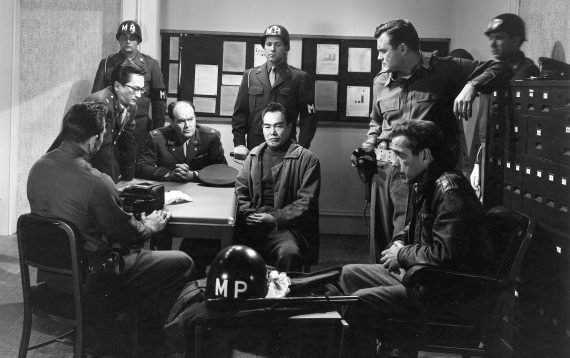
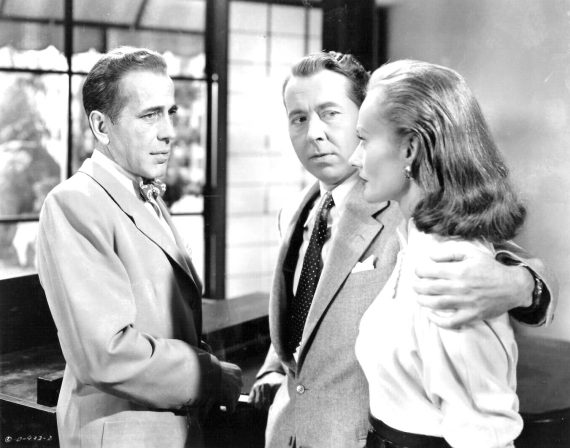
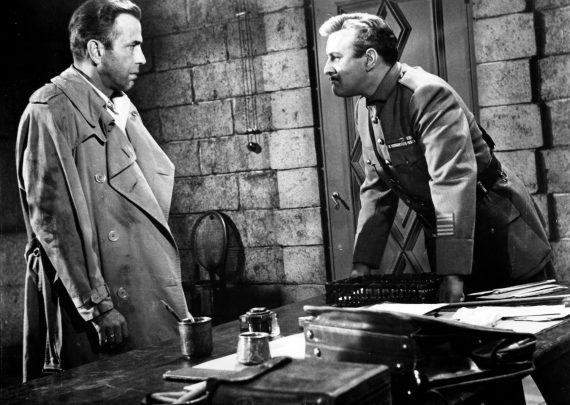


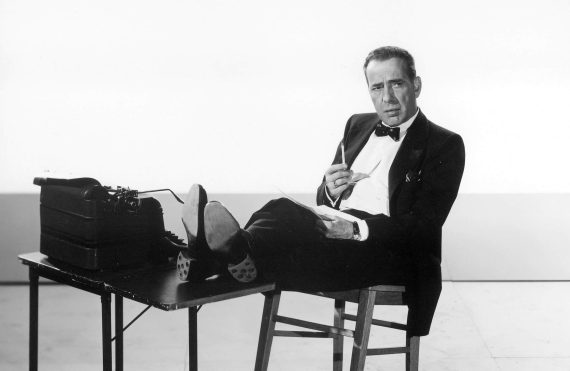

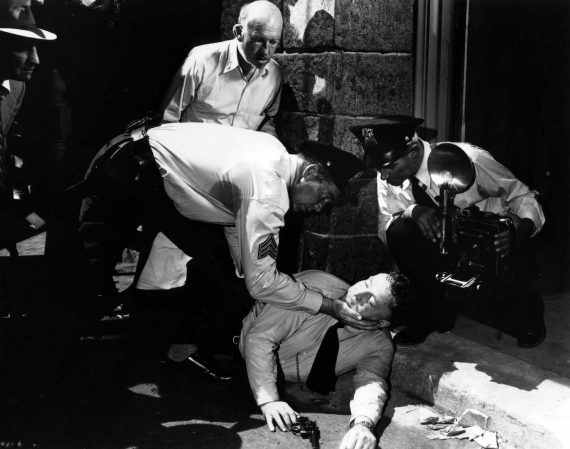
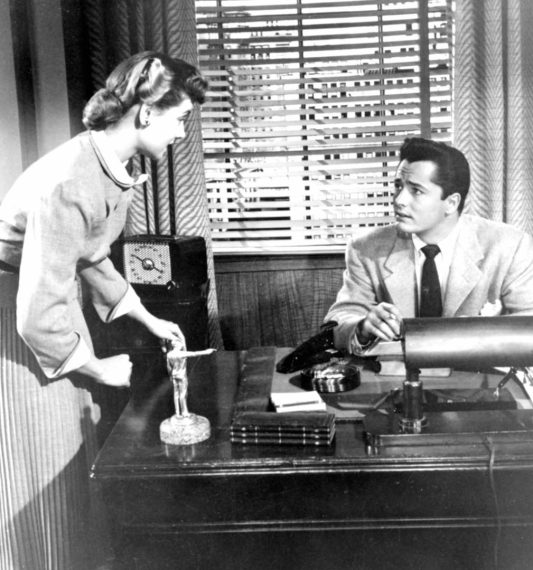

Leave a Reply